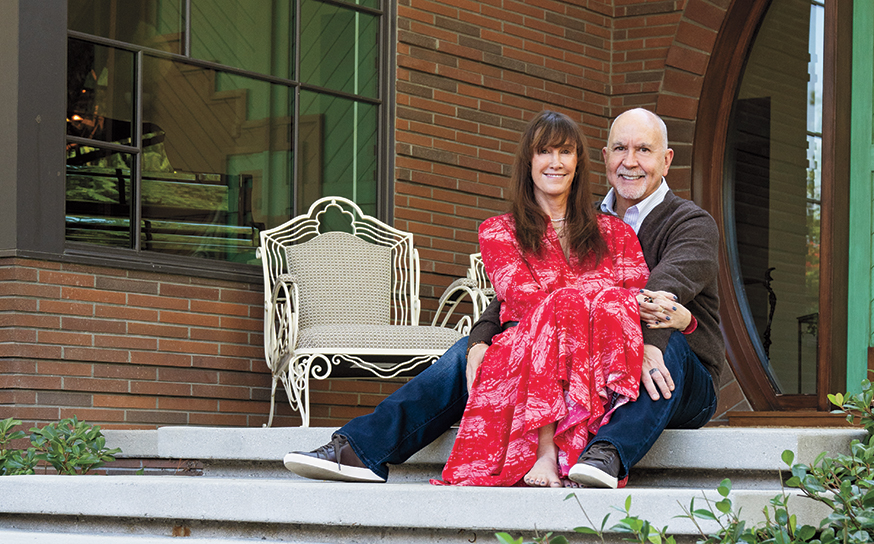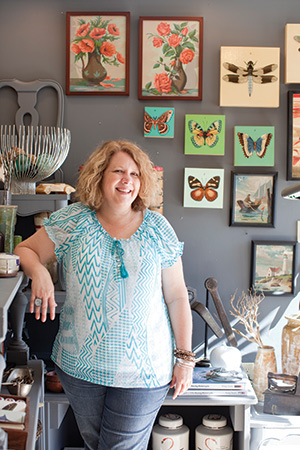
Authors Cynthia Muchnick and Jenn Curtis on The Parent Compass
A college admission guidebook.
-
CategoryPeople
-
Illustrated byNikki Smith
The Varsity Blues scandal blew the lid off the college admissions process two years ago. For many parents, the scandal reinforced suspicions: The process is not only challenging, but it can also be unfair and even corrupt. With so many deferrals and postponements in 2020—and an absence of standardized testing—COVID has made the process even more challenging.
College admissions experts Cynthia Muchnick and Jenn Curtis address the challenges and offer guidance in their new book The Parent Compass: Navigating Your Teen’s Wellness and Academic Journey in Today’s Competitive World. Here VB editor Linda Grasso queries the authors about some of the new challenges that have arisen, gleaning some critical dos and don’ts.
 How has the Varsity Blues scandal changed the admissions process?
How has the Varsity Blues scandal changed the admissions process?
Cynthia: Varsity Blues was a loud wake-up call. It was an important explosion because it held a mirror up to so much of what has been going on that is wrong when comes to parenting and the college admissions process. That is a large part of why we wrote The Parent Compass. It is a parenting etiquette guide. What are right behaviors? What are the gray areas? And what are the wrong behaviors?
Jenn: We have learned from this how important it is to really see our kids for who they are. When we don’t truly see our kids, it undermines our relationship with them, and they don’t feel understood and accepted. We do not empower our kids when we pave the way for them. It is essentially saying they’re not good enough. And it is not letting them learn the skills they need to thrive in the real world.
And we’ve learned that we parents shouldn’t constantly talk about college rankings. Be cognizant of the biases you are putting on your kids about what you perceive are better, bigger-name colleges. Focus on the right fit for your kids’ learning style and objective.
But so many parents, it seems, think that for their kid to be successful in life, they need to go to a big-name college.
J: Yes, agree. One of the parents said when they went to jail something that is so potent: “I realize now that cheating on her behalf was not about helping her, it was about how it would make me feel.” Same goes for attending a prestigious college: Much of it is about what those parents wanted for themselves. They totally lose sight of what their kids want and need.
Advice on the college essay?
C: Don’t write your kid’s essays or heavily edit them. The student essay is a chance for your child’s voice to be heard. It’s called a personal statement for a reason. When the essay sounds like the parent, it silences the student and tells them that their voice isn’t worth being heard.
What if your kid isn’t a good writer?
C: That’s OK. They will find a way for their voice to be heard. There is no greater red flag than a B or C student writing an essay that looks like a New York Times reporter wrote it. I encourage students to read their essay out loud in front of a mirror to make sure it sounds like them.
J: It is obvious to colleges when parents write the essays, and it hurts kids in the long run.
What else should parents avoid doing?
J: We don’t think social media announcements and celebration videos by parents are a good idea. It can make other kids and their parents—who perhaps haven’t gotten in—feel bad. Other kids can even blacklist your kid for what they perceive as bragging.
C: We share a lot of anecdotes in the book about this. One parent posted a celebratory video on their Facebook page and the next day at school that student was basically disowned by their friends. Her entire senior year was ruined.
How has the cancellation of standardized testing in 2020 impacted the process?
J: With the testing sites shut down, pretty much every school had to go test-optional. That was a short-term change, but it has the potential to change the long-term. Schools are still deciding if they are going to go test-optional for another year—maybe forever. Lots of families are unsure whether or not they should have their rising juniors and seniors test. My advice at this point is yes. Also, the College Board has now officially dropped the requirement of the SAT essay, as well as the SAT Subject Tests
As a result of the year with no standardized testing, we saw wait lists grow, and applications skyrocket at some of the most competitive schools. At the same time, applications plummeted at some of the less-selective schools, which has created a kind of chasm.
Why did that happen?
J: With the competitive schools going test-optional, kids thought that they had a better chance of gaining admission. Students applied to a lot more schools—schools they wouldn’t have in a normal situation.
C: There was a lot of disappointment this past spring when kids got their admission decisions. And it could be the same situation for this year’s applicants. That said, we parents need to be flexible. Going straight into a four-year college out of high school isn’t always the right route. And if kids have overreached in terms of schools applied to and they don’t get in, parents need to be open to alternative routes: taking community college classes and transferring, joining the workforce or military, doing an internship. Those options can be silver linings, giving students another story to tell.
Do you feel that the impact of COVID on the process will be felt for multiple years?
C: I think that over the next few years we will see the economic impact. I think we may see colleges respond to the increased number of applicants and use some of their endowments to build more dorms. And I think we’ll see more well-rounded kids who have had life experiences before attending college.
Do you think college costs will rise?
C: There is a lot of revenue to recoup like lost housing and food services revenue and professor pay. I think colleges are scrambling with their business models. When colleges have huge endowments, why can’t they bail themselves out of this financial crisis? I realize there are limitations on what they can do with an endowment but I would think a crisis like a pandemic should qualify.
What else can we do as parents?
J: Allow our kids to take ownership of the process. Kids can and should own every part of the college search/selection process. Expose them to a variety of schools and keep an open mind. Most importantly, research tells us that it matters more what you do on your campus more than where you go. Integrate that into how you approach the admissions process.
For more counsel from Jenn and Cynthia, check out their episode on the SheSez with Linda Grasso podcast, available across all platforms and at SheSez.com











